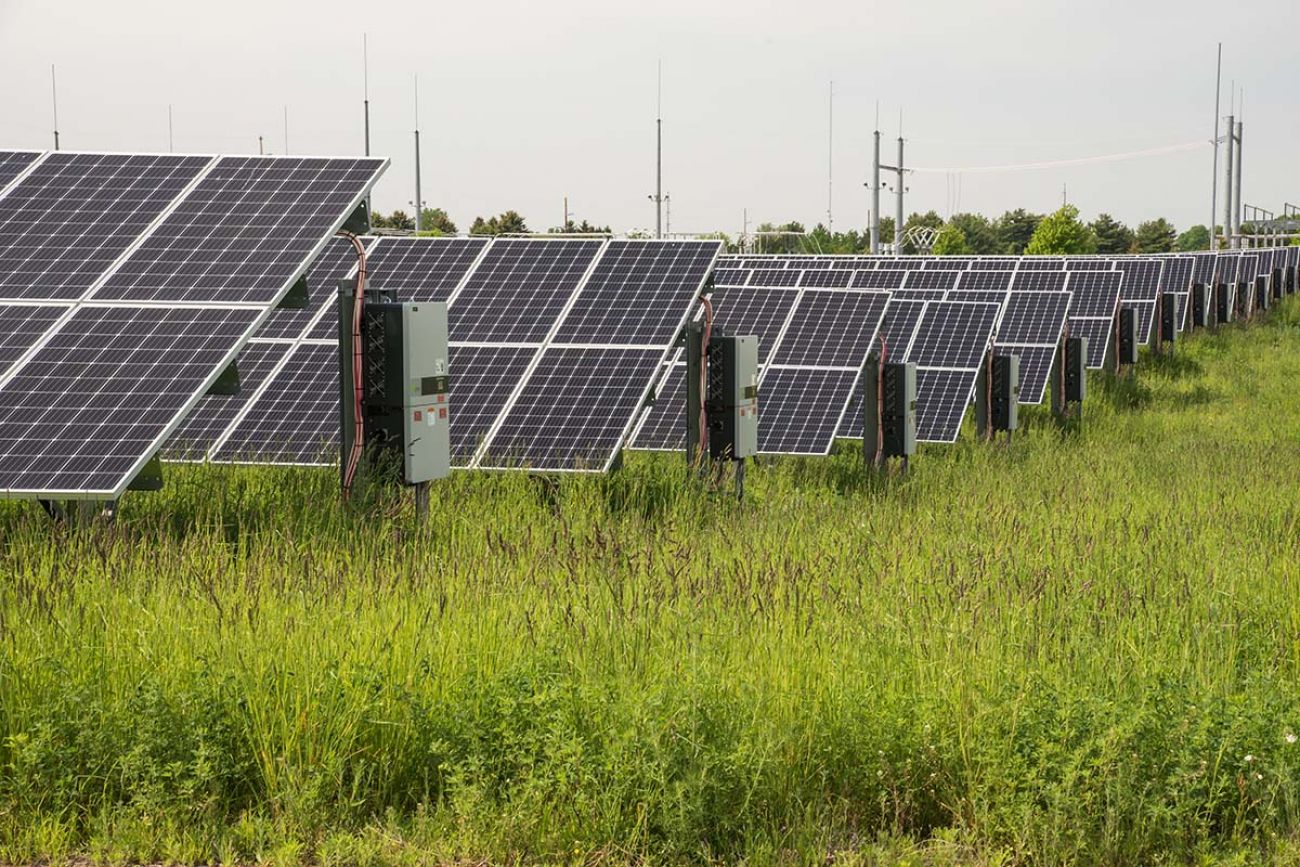Activists push Michigan for bolder, faster climate efforts

As Michigan regulators consider how to transition the state away from fossil fuels by 2050, activists want them to focus more heavily on housing, transportation and rooftop solar.
During the first of two scheduled listening sessions as state regulators circulate the draft climate plan published this month, activists on Wednesday lauded the plan as a milestone in Michigan’s energy transition, but pushed the state to be more aggressive.
The draft plan, released in response to Whitmer’s 2020 vow to make Michigan carbon neutral by 2050, comes amid growing scientific agreement about the need to transition as quickly as possible away from fossil fuels, or risk dire consequences in the form of worsening floods, fires, droughts and sea level rise.
Related:
- Updating Michigan energy rules on new homes faces pushback from builders
- Michigan legislation would help homeowners pay for failing septic systems
- ‘This is the big one.’ Michigan celebrates landmark $7B GM investment
The state’s largest utilities have vowed to go carbon neutral by midcentury, and Tuesday’s announcement of GM’s coming $7 billion investment in Michigan is one of many recent signals that automakers are racing to capitalize on a post-petroleum future.
The new climate plan adds yet more items to the state's to-do list, calling for Michigan to get half of its electricity from renewables by 2030, stop using coal by 2035 and build enough charging stations to support 2 million electric vehicles by 2030.
From a faster timeline to decarbonization to greater emphasis on justice, here are five emerging points of contention as regulators open the draft plan up for public scrutiny:
Is 2050 fast enough?
Michigan’s plan calls for the state to get half of its electricity from renewable sources by 2030, and eliminate coal-fired power by 2035.
Kate Madigan, director of the Michigan Climate Action Network, urged the state to instead push to get 100 percent of Michigan’s electricity from renewables by 2030.
“And we should only replace fossil fuels with clean renewable energy sources,” Madigan said.
Michigan utilities are continuing to invest in natural gas as a “bridge” fuel while they divest from coal. Consumers Energy, for example, last year announced plans to purchase four gas plants that the company said will “supply steady, reliable electricity for homes and businesses as the company invests more heavily in renewable energy.”
Madigan, in pushing for a more ambitious timeline, called it “the urgency that the science requires” as the world faces worsening floods, wildfires and other climate impacts caused by burning fossil fuels.
Housing
The state’s climate plan calls for updating building codes to boost energy efficiency in new homes, and bolstering requirements for utilities to reduce energy waste.
Environmentalists want regulators to focus more on weatherizing old homes and making sure new homes are capable of running on clean energy.
More than 75 percent of Michigan homes are heated with natural gas, according to state figures. Those without the capacity to heat and cook with electricity are not ready to switch to wind or solar – a reality that has inspired the climate activist motto to “electrify everything.”
“Electrification is somewhat glossed over in this plan,” said Dianna Corpolongo, a representative with the renewable energy nonprofit Slipstream who urged state officials to incentivize gas-free heat sources like electric heat pumps.
Others said Michigan could make big climate gains by simply making existing homes more efficient. Many of Michigan’s older homes lack modern insulation, double-paned windows and other efficiencies. That not only wastes energy, but causes utility bills to skyrocket – a major problem for low-income people who are more likely to live in old, inefficient homes.
“The plan should explicitly call for a major increase in weatherization of low-income homes,” said Martin Kushler, a Wixom resident and senior fellow with the American Council for an Energy-Efficient Economy.
Transportation
Michigan might be the birthplace of the automobile, but transit activists argue the state can’t reach its climate goals without making it easier for people to travel by bus, bike or their own two feet.
“We’re a car state,” said commenter Abigail Clark, “but having cars be the only option is a form of dependency. It keeps you trapped.”
Detroit’s public transit system consistently ranks among the nation’s worst, and the city transit agency is currently considering route cuts that would further reduce service reliability.
Michigan’s climate action plan sets target dates to transition to electric cars, buses and delivery trucks, but it includes no hard requirements for the state transportation agency to track the greenhouse gas emissions of its projects.
Transit activists pointed out that discrepancy while calling upon the state to deprioritize projects such as highway widening, arguing it helps cement Michigan’s car-dependency.
“Change does not happen without explicit requirements,” said Megan Owens, executive director of Transportation Riders United.
Rooftop solar
Activists, utilities, and a host of policymakers on both sides of the aisle agree that Michigan’s energy future should include plenty of solar panels.
But just who gets to generate and sell all that energy has been a subject of hot debate in Lansing for years, thanks to the “cap” that limits how many Michiganders can reap the full financial benefits of rooftop solar.
Consumer advocates and environmental groups, who favor lifting the cap, have been sparring with utilities who argue rooftop solar owners are compensated too generously for the power they feed to the grid, resulting in a subsidy that other customers are forced to shoulder in the form of higher rates.
State officials heard an earful Wednesday from people who see rooftop solar arrays as a way to get more clean energy, faster, while “democratizing” access to energy by allowing residents to get carbon-free power now, instead of waiting for utilities to replace coal and natural gas plants with utility-scale solar and wind arrays.
Justice
Michigan’s draft climate plan follows a Biden administration initiative known as Justice40, which calls for 40 percent of investments tied to the plan to be spent in disadvantaged communities that have long borne the brunt of pollution.
Activists on Wednesday pushed state officials to more clearly articulate how they’ll support that goal. Some said there is more the state could be doing now – without new investment – to protect the communities most impacted by environmental harm.
Kalamazoo activist Brandi Crawford-Johnson, who has fought against the planned expansion of Graphic Packaging International’s Kalamazoo factory, called for policy changes such as denying permit applications that would increase greenhouse gas emissions at factories and other major emitters.
Noting that people living in pollution hot spots already face lower life spans, Crawford-Johnson said “climate change will only make the death gap worse.”
Nuclear
Michigan’s three nuclear power plants aren’t mentioned in the draft climate plan. But they got considerable attention Wednesday from nuclear proponents hoping for a last-minute reconsideration of plans to close the Palisades plant in Covert Township.
Noting that Michigan’s nuclear power plants currently provide nearly a third of Michigan’s electricity, nuclear proponents warned that a premature shutdown could increase Michigan’s reliance on fossil fuels.
“It’s going to be difficult enough for Michigan to meet its stated climate goals,” said James Hopf, with the pro-nuclear group Generation Atomic. “We can’t afford to start that effort by taking a huge step backwards.”
Other commenters called nuclear a “false solution,” pointing out the ecological and human harm caused by disasters such as the 2011 meltdown at the Fukushima Daiichi Nuclear Power Plant in Japan, and the difficulty of finding permanent storage sites for the radioactive waste generated at nuclear plants.
“We’ve got no place to put it,” said Phillip Lamoureux, a retired scientist.
Finding places to store nuclear waste has been a subject of recent contention in the Great Lakes region, with Canada’s plan to store spent nuclear fuel underground near Lake Huron prompting outcry from U.S. lawmakers.
The state will continue taking public comments on the draft climate plan during a virtual listening session on Feb. 8 at 6 p.m. Officials are also taking written comments at EGLE-ClimateSolutions@Michigan.gov.
Michigan Environment Watch
Michigan Environment Watch examines how public policy, industry, and other factors interact with the state’s trove of natural resources.
- See full coverage
- Subscribe
- Share tips and questions with Bridge environment reporter Kelly House
Michigan Environment Watch is made possible by generous financial support from:
Our generous Environment Watch underwriters encourage Bridge Michigan readers to also support civic journalism by becoming Bridge members. Please consider joining today.
See what new members are saying about why they donated to Bridge Michigan:
- “In order for this information to be accurate and unbiased it must be underwritten by its readers, not by special interests.” - Larry S.
- “Not many other media sources report on the topics Bridge does.” - Susan B.
- “Your journalism is outstanding and rare these days.” - Mark S.
If you want to ensure the future of nonpartisan, nonprofit Michigan journalism, please become a member today. You, too, will be asked why you donated and maybe we'll feature your quote next time!






